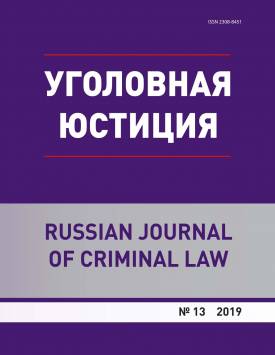The Structure of Criminological Recidivism of Persons Convicted Without Imprisonment
The statistics of the past ten years testify to the growing number of courts' sentences and other criminal law measures without isolation from society; more than 70% of convicts are not deprived of their liberty. This practice basically corresponds to the modern trend of criminal policy liberalization, aimed primarily at "saving" criminal repression by reducing real deprivation of liberty. This happens both through the use of probation and real punishment not related to isolation from society. This circumstance contributes to the urgency of the problem of increasing their effectiveness. The commission of a new crime by a convicted person (criminological recidivism) is an important criterion not only of the effectiveness of criminal punishment, but also of the organization of its execution. Among the important qualitative characteristics of this relapse to a criminal behavior is its structure. A sociological study of the nature of the crimes committed by "recidivists" was made. Its data were structured on the basis of the criminal motivation inherent to criminals, the degree of public danger of encroachment and the manner in which they were committed. As a result of analyzing the structure of criminological recidivism of persons sentenced to punishment and other measures not related to deprivation of liberty, conclusions were made about the influence of the nature of the previous crime of perpetrators on their new crime if it had been committed. Criminological recidivism after conviction for theft, for crimes against the family and minors (usually represented by alimony evasion) has a high proportion of specialization from 57% to 63%, that is, after conviction, recidivists frequently violate the same rule of criminal law. Recidivism after deliberate violent encroachment on life and health is more differentiated and, consequently, tends to become general recidivism, which is explained by the situational nature of such crimes.
Keywords
альтернативные наказания, осужденные без лишения свободы, криминологический рецидив, alternative sentences, persons convicted without imprisonment, criminological recidivismAuthors
| Name | Organization | |
| Drozdov Igor S. | Shegarka District Prosecutor's Office | crim.just@mail.ru |
References

The Structure of Criminological Recidivism of Persons Convicted Without Imprisonment | Ugolovnaya yustitsiya – Russian Journal of Criminal Law. 2019. № 13. DOI: 10.17223/23088451/13/25
